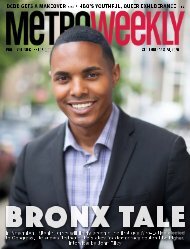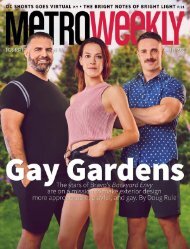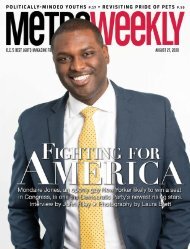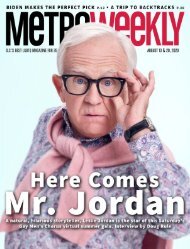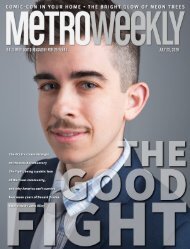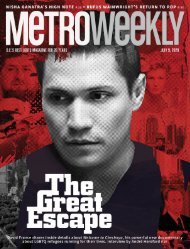Victory Fund's Annise Parker - Metro Weekly - July 16 2020
Cover Story: Annise Parker rose to become Houston’s first LGBTQ mayor. Now leading the Victory Fund, she’s helping others reach even higher. Interview by John Riley Also: The newly-rechristened Chicks return with a comeback album that showcases their greatest strengths.
Cover Story: Annise Parker rose to become Houston’s first LGBTQ mayor. Now leading the Victory Fund, she’s helping others reach even higher. Interview by John Riley
Also: The newly-rechristened Chicks return with a comeback album that showcases their greatest strengths.
You also want an ePaper? Increase the reach of your titles
YUMPU automatically turns print PDFs into web optimized ePapers that Google loves.
“I’m not old enough for Stonewall, but I’m not<br />
that much past it,” says <strong>Annise</strong> <strong>Parker</strong>. “I was a fly<br />
on the wall for virtually every significant LGBTQ<br />
event in Texas in the ’70s and ’80s.”<br />
Activism has been a hallmark of <strong>Parker</strong>’s life, ever since the president and<br />
CEO of LGBTQ <strong>Victory</strong> Fund and <strong>Victory</strong> Institute attended her first political<br />
organizing event — the Texas Gay Conference — during her sophomore year at<br />
Rice University in 1975. A founding member of Rice University’s LGBTQ student<br />
group in 1979, <strong>Parker</strong> would later work for several LGBTQ organizations,<br />
including the Houston Gay and Lesbian Political Caucus, the Lesbian/Gay Rights<br />
Lobby of Texas, the Lesbian/Gay Democrats of Texas, and briefly, as a <strong>Victory</strong><br />
Fund board member shortly after the organization’s founding in 1994.<br />
A natural introvert and self-described loner who was raised in a conservative<br />
Republican household, nothing in <strong>Parker</strong>’s upbringing indicated that she would<br />
one day become one of the nation’s most prominent LGBTQ figures. But her<br />
parents and grandparents taught her the importance of civic engagement from a<br />
young age, a lesson she later incorporated into her own activism, much of which<br />
took place after regular work hours.<br />
“I was an oil company employee by day, activist by night,” she says. “I was<br />
spending 40 hours a week at work, and 10 to 20 hours a week as an actively gay<br />
volunteer. Throughout the ’80s, I was arguably the most visible lesbian activist<br />
in Houston.”<br />
In 1991, <strong>Parker</strong> ran for a Houston City Council seat, in hopes of providing<br />
political representation for the city’s LGBTQ community. Outraised financially<br />
and outmaneuvered strategically, she suffered one of her worst political defeats.<br />
Four years later, she ran for special election to an at-large seat, finishing third<br />
among 19 candidates. The early losses taught her valuable lessons about campaign<br />
organizing, messaging, the importance of fundraising, and creating political<br />
alliances — all of which she utilized in a successful bid for an at-large seat on<br />
the Council in 1997.<br />
<strong>Parker</strong> would be elected by the citizens of Houston eight more times, serving<br />
as an at-large councilmember, the city controller, and ultimately, its mayor for<br />
three terms. When she assumed the mayoralty of the country’s fourth-largest<br />
city in January of 2010, she also became the first out LGBTQ mayor of a major<br />
American city.<br />
In January 2018, <strong>Parker</strong>, who lives in Houston with her wife of 30 years,<br />
Kathy Hubbard, assumed the helm of the LGBTQ <strong>Victory</strong> Fund, a political action<br />
committee that seeks to get LGBTQ people elected to public office, and <strong>Victory</strong><br />
Institute, its educational nonprofit arm, which provides training and specialized<br />
programs to potential political office-seekers and support to LGBTQ officeholders<br />
to better ensure their success.<br />
<strong>Parker</strong>’s oversight of the <strong>Victory</strong> Fund has come amid a surge in the number<br />
of LGBTQ individuals seeking political office, as well as an increase in the<br />
number of LGBTQ elected officials. In the United States, that number currently<br />
stands at 855, covering officeholders from both major political parties as well as<br />
nonpartisan elected leaders in local, legislative, and statewide offices in 47 of 50<br />
states and the District of Columbia.<br />
“There are almost 900 openly LGBTQ candidates who are running across<br />
America this year,” she says. “<strong>Victory</strong> [Fund] has engaged, at least at a minimal<br />
level, with about half of them. And we’ll probably end up endorsing about 300 of<br />
them as the most viable candidates.”<br />
24<br />
JULY <strong>16</strong>, <strong>2020</strong> • METROWEEKLY.COM




